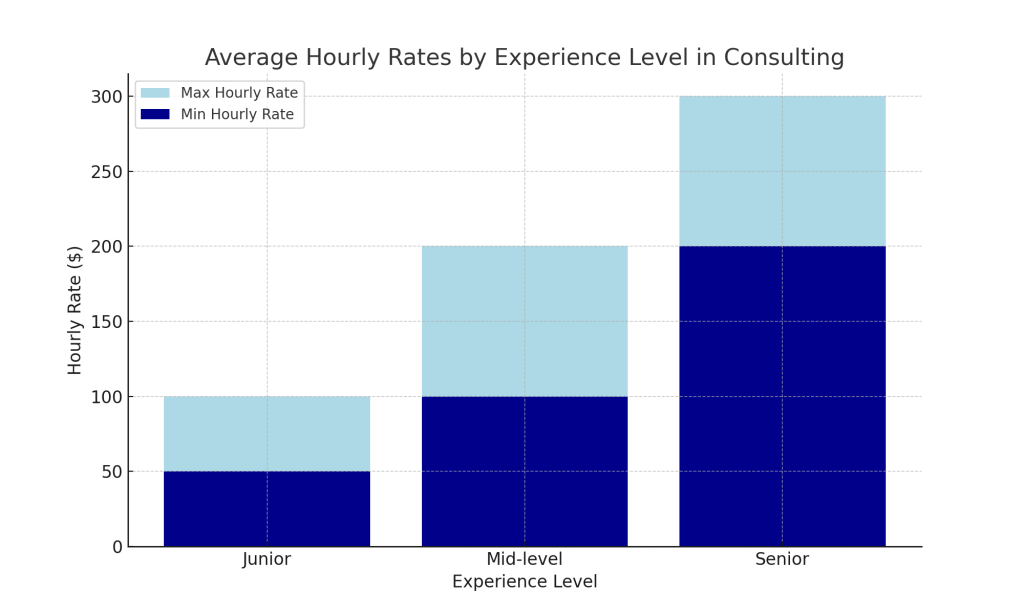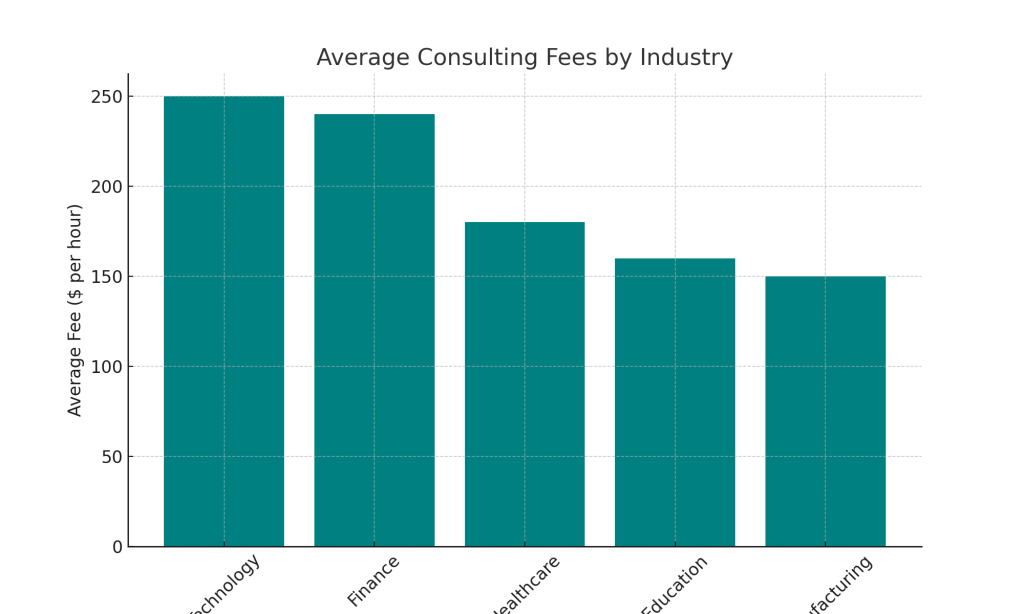Consulting Cost & Fees Calculator: Pricing Guide
Monthly Billable Days
Monthly Expenses
Monthly Target Income Before Tax
Guide to Using the Consulting Fees Calculator
- Access the Calculator: Open the Consulting Fees Calculator on your device. You will be greeted with a simple and user-friendly interface.
- Monthly Billable Days:
- Number of Working Days: Enter the number of days you plan to work in a month. This does not include weekends or days you choose not to work. The maximum value is 31.
- Average Working Hours per Day: Input the average number of hours you work each day. This helps in calculating your hourly rate.
- Monthly Expenses:
- Here, you will input your various monthly business expenses. This section is divided into several fields, each representing a different expense category:
- Advertising and Marketing: Costs related to promoting your services.
- Equipment, Hardware, and Software: Expenses for the tools and technology required for your work.
- Training and Education: Costs for any ongoing professional development or courses.
- Memberships and Associations: Fees for professional bodies or networks.
- Business Insurance: Your monthly insurance expenses.
- Office Expenses: Regular costs such as telephone, internet, and electricity.
- Rent: If you rent an office space, or a portion of your home used as an office.
- Office Supplies, Shipping, Printing: Miscellaneous office materials and shipping costs.
- Accounting and Legal Fees: Professional services for legal advice or accounting.
- Here, you will input your various monthly business expenses. This section is divided into several fields, each representing a different expense category:
- Monthly Target Income Before Tax:
- Enter the amount you aim to earn before taxes each month. This is your target income.
Understanding the Results
- Once you have entered all the necessary data, the calculator will automatically update the results at the bottom of the form.
- Daily Billable Rate: This is how much you should charge per day to meet your financial goals based on the data provided.
- Hourly Rate: This breaks down your daily rate into an hourly figure, giving you flexibility in how you charge for shorter engagements or consultations.
Tips for Use
- Regular Updates: Revisit and update the calculator regularly, especially when your expenses or income goals change.
- Contextual Adjustments: Consider the context of each project. For more complex or demanding projects, you might want to adjust your rates accordingly.
- Market Trends: Keep an eye on market rates and adjust your fees if necessary to stay competitive.
This calculator is a valuable tool to help ensure that your consulting work is priced correctly, balancing your business costs with your income goals.

Consulting Fees Calculator
In the dynamic and diverse world of consulting, one of the most critical decisions a consultant faces is determining the right fee to charge their clients. This decision is far from straightforward and involves a delicate balance between valuing one’s expertise and understanding the client’s perspective and market standards. Consultants, whether they are working independently or as part of a firm, must navigate through various factors to arrive at a fee that is both fair and competitive.
The complexity of this task is where a Consulting Fees Calculator becomes a game-changer. This tool is designed to help consultants systematically evaluate and determine appropriate charges for their services. It takes into account various influencing factors such as the consultant’s experience, the nature of the project, the duration of the engagement, and current market trends. By inputting these variables, the calculator provides a fee estimate that aligns with industry standards while also reflecting the consultant’s unique value proposition.
The purpose of this comprehensive guide is to explore the intricacies of consulting fees and the role of a Consulting Fees Calculator in setting these fees. We will start by understanding the different types of consulting fees, the factors that influence these fees, and how a calculator can aid consultants in making informed pricing decisions.
Understanding Consulting Fees
A crucial aspect of consulting is the understanding of different fee structures and how they align with various types of projects and client needs. Here, we delve into the common types of fee structures in the consulting world and the market trends affecting these fees.
1. Types of Fee Structures
Hourly Rate: This is one of the most straightforward fee structures. Consultants charge clients based on the number of hours they spend working on a project. It’s a flexible model that can accommodate changes in the scope of work. However, it can sometimes lead to unpredictability in total costs for the client.
Project-Based Rate: Under this structure, consultants charge a fixed fee for the entire project. This fee is agreed upon before the commencement of the project and is based on an estimate of the work involved. This model is beneficial for projects with a well-defined scope and offers clients a clear understanding of the total cost upfront.
Retainer: A retainer fee is a regular, recurring payment made by a client for ongoing services. This model is typically used for long-term relationships where the consultant provides continuous, as-needed services. It ensures a steady income for the consultant and readily available expertise for the client.
Value-Based Pricing: In this model, fees are determined based on the value or results provided to the client, rather than the time spent or the specific service delivered. This approach aligns the consultant’s incentives with the client’s goals and can lead to higher compensation for highly impactful work. However, it requires a clear understanding of the value delivered and can be more complex to negotiate.
2. Market Trends in Consulting Fees
Consulting fees are not static and vary widely based on several factors. Some of the key determinants include:
- Industry: Different industries have varying standard rates. For example, consultants in fields like finance or technology may command higher fees due to the specialized knowledge required.
- Consultant’s Experience: More experienced consultants, especially those with specialized skills or reputations as thought leaders in their field, can often charge higher rates.
- Geographic Location: The cost of living and the economic conditions of a consultant’s location can influence fee structures. Consultants in major metropolitan areas or high-cost regions may have higher rates than those in less expensive areas.
- Specialized Skills: As the demand for niche skills or expertise increases, consultants possessing these capabilities can charge premium rates.
Overall, the trend in consulting fees has been observed to align closely with market demands, especially for specialized skills and expertise. This dynamic nature of consulting fees makes it essential for consultants to stay informed about market rates and adjust their fee structures accordingly.
Factors Influencing Consulting Fees
Determining the right fee for consulting services isn’t just about picking a number. It’s a nuanced decision influenced by a variety of factors. Understanding these factors is crucial for consultants to set fair and competitive fees that reflect the value they offer. Here, we explore the key elements that play a significant role in shaping consulting fees.
1. Experience and Expertise
The level of experience and the breadth of expertise a consultant brings to the table are among the most significant factors influencing fee levels. Typically, more experienced consultants, especially those with specialized skills or unique expertise, can command higher fees. This is attributed to their ability to provide greater value to clients, often in the form of more insightful advice, efficient problem-solving, and access to a broader network of resources.
2. Industry and Project Type
The industry in which a consultant operates can have a substantial impact on fee structures. Some sectors, like technology, finance, or legal, tend to have higher standard fees due to the specialized knowledge and skills required. Furthermore, the nature of the project also plays a crucial role. Strategic projects, for instance, might command higher fees compared to more operational tasks. The complexity, scope, and impact of the project are all considered when setting fees.
3. Location
Geographical factors cannot be overlooked when discussing consulting fees. The cost of living and the economic conditions in a consultant’s location significantly affect the fee levels. For example, consultants based in major cities or regions with a higher cost of living generally charge more than those in less expensive areas. This variation is also reflective of the varying market rates and economic conditions across different regions.
4. Client Relationship
The nature of the relationship with the client can also influence fee decisions. For long-term clients, or those offering high-volume work, consultants might offer discounted rates as a gesture of goodwill and to foster a lasting relationship. Such arrangements are beneficial in creating a steady stream of work and ensuring client loyalty, but they must be balanced against the need to maintain a sustainable fee structure.
The Role of a Consulting Fees Calculator
In the ever-evolving landscape of consulting, setting the right fee for services can be a challenging task. This is where a Consulting Fees Calculator becomes a valuable asset. It serves as a tool that simplifies the process of estimating appropriate fees by integrating various critical factors.
Purpose of a Consulting Fees Calculator
A Consulting Fees Calculator is designed to help consultants estimate a fee that is fair, competitive, and aligned with market standards. This tool takes into consideration a range of inputs, including:
- Experience level of the consultant
- Industry standards
- Project duration
- Complexity of the project
- Additional costs and expenses
By analyzing these factors, the calculator provides an estimated fee that accounts for the unique aspects of each consulting engagement.
Creating a Consulting Fees Calculator
Developing an effective Consulting Fees Calculator involves several key steps:
1. Identifying Key Variables
To create a practical and useful calculator, it is essential to identify and incorporate the variables that significantly influence consulting fees. These include:
- Experience Level: Categorizing consultants as Junior, Mid-level, or Senior, each with different base rates reflecting their expertise and market value.
- Industry: Recognizing the differing standard fees across various industries such as Technology, Healthcare, Finance, and more.
- Project Complexity: Classifying projects based on their complexity – Low, Medium, or High – which affects the effort and resources required.
- Duration: Considering the project duration, which can range from a few hours to several months, impacting the fee structure.
2. Developing the Calculator
The development of the calculator involves creating a simple yet effective algorithm that utilizes the identified variables. This algorithm typically:
- Starts with a Base Rate: Determined by the consultant’s experience level.
- Applies Industry Modifiers: Adjusting the base rate based on the specific industry involved.
- Considers Project Complexity and Duration: Further refining the fee based on the complexity and length of the project.
For instance, a senior consultant working on a high-complexity project in the finance industry for a month-long duration would have a different fee calculation compared to a junior consultant working on a low-complexity project in the healthcare industry for just a few days.
Example Calculation Using a Consulting Fees Calculator
To illustrate how a Consulting Fees Calculator works, let’s consider a hypothetical example. This example will demonstrate how the calculator integrates various factors like the consultant’s experience level, industry type, project complexity, and duration to arrive at an appropriate fee.
Step-by-Step Calculation
- Determine the Base Rate: The base rate is primarily determined by the consultant’s experience level. For example:
- Junior Consultant: $100 per hour
- Mid-level Consultant: $200 per hour
- Senior Consultant: $300 per hour
- Apply the Industry Modifier: Different industries have varying standard rates due to the complexity or specialized knowledge required. The industry modifier adjusts the base rate accordingly. For instance:
- Technology: 1.2x
- Healthcare: 1.1x
- Finance: 1.3x
- Adjust for Project Complexity: The complexity of the project can significantly affect the workload and expertise required. Complexity modifiers might be as follows:
- Low Complexity: 1.0x (no change)
- Medium Complexity: 1.1x
- High Complexity: 1.2x
- Consider the Duration: The duration of the project can also influence the overall fee. For shorter projects, a higher rate might be charged to cover the initial setup and administrative costs.
Example Scenario
Let’s assume a mid-level consultant is working on a medium-complexity project in the healthcare industry for a duration of 30 days. Here’s how the fee would be calculated:
- Base Rate: $200 per hour (mid-level consultant)
- Industry Modifier: 1.1x for Healthcare
- Complexity Modifier: 1.1x for Medium Complexity
Calculation:
- Adjusted Hourly Rate: $200 (Base Rate) * 1.1 (Industry Modifier) * 1.1 (Complexity Modifier) = $242
- Total Fee for the Project: If the consultant works an average of 8 hours per day, the total fee for a 30-day project would be $242 * 8 hours/day * 30 days = $57,984
Visualizing Consulting Fees: A Graphical Overview
Graph 1: Average Hourly Rates by Experience Level

Here is the graph illustrating “Average Hourly Rates by Experience Level” in consulting:
- The graph shows a clear trend of increasing hourly rates with rising experience levels.
- For Junior consultants, the hourly rates range between $50 to $100.
- Mid-level consultants have hourly rates ranging from $100 to $200.
- Senior consultants command the highest rates, from $200, and can go above $300.
This graphical representation provides a visual understanding of how experience significantly impacts the hourly rates that consultants can charge, reflecting the value of expertise and experience in the consulting field.
Graph 2: Fee Variation by Industry

Here is the graph illustrating “Average Consulting Fees by Industry”:
- It highlights that Technology and Finance industries tend to have higher consulting fees compared to other sectors like Healthcare, Education, and Manufacturing.
- This graph provides a clear visual representation of how industry choice impacts the average consulting fees.
The graph has been saved as an image file. You can download it using the following link:
Final Thouth for Consulting Cost Calculator

The Consulting Fees Calculator emerges as an indispensable tool in the arsenal of modern consultants. Its primary value lies in enabling consultants to objectively and accurately determine fees that are not only fair but also competitive in the current market landscape. This tool takes the guesswork out of fee setting, replacing it with a structured and data-driven approach.
By integrating a variety of crucial factors such as experience level, industry norms, project complexity, and duration, the calculator allows consultants to tailor their fees to each unique project and client. This customization ensures that the fees charged are a true reflection of the value provided, balancing the consultant’s expertise and the specific needs of the project.
Moreover, the use of such a calculator acknowledges and adapts to the evolving market trends. As the demand for specialized skills fluctuates and the consulting industry continues to grow and change, having a dynamic tool that can adjust to these changes is invaluable. It helps consultants stay competitive and relevant, ensuring that their pricing strategies align with the current market conditions.
In essence, a Consulting Fees Calculator is more than just a tool for setting fees; it’s a means for consultants to validate their worth, maintain fairness in their pricing, and establish a transparent and trust-based relationship with their clients. It reinforces the idea that a well-considered and justified fee structure is fundamental to the success and sustainability of a consulting practice.
Relevant Articles:
- Consultant Insurance
- Wine Consultant Insurance
- Sleep Consultant Insurance
- Control Consulting Insurance
- Fundraising consultants’ insurance
- Software Consultant Insurance
- Lactation Consultant Insurance
- Marketing Consultant Insurance
- SEO Consultant Insurance
- IT Consultant Insurance
- Financial Consultant Insurance
- AI Consultant Insurance
- Drone Consultant Insurance

